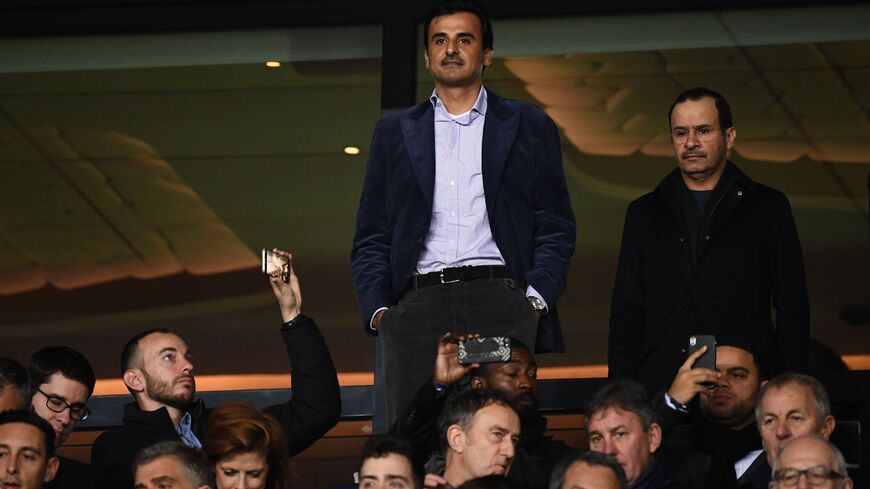If Sheikh Jassim bin Hamad Al Thani’s bid to buy Manchester United succeeds, he could capitalize on nearly all of the soccer club’s global fan base of 1.1 billion people, including its followers in the Middle East, a soccer finance expert told Al-Monitor.
Al Thani, a banker and the son of a former prime minister of Qatar, is the favorite to acquire Manchester United ahead of British businessman Jim Ratcliffe due to the potential business opportunities for the club’s current owners, the Glazer family, The Guardian reported on Wednesday.
After the sheikh's representatives met with the club's executives on Thursday, Al Thani was expected to make a second bid for the club, SkyNews reported. Ratcliffe, who is the owner of INEOS chemicals group, is meeting with the club executives on Friday.
Al Thani, the chairman of Qatar Islamic Bank (QIB), is understood to be offering a 100% buyout of the club with no debt financing and a commitment to investment in infrastructure such as training facilities, the stadium and redevelopment around the Old Trafford area.
Ratcliffe is understood to want to buy the Glazers’ 69% share in the soccer team using debt.
The Daily Mail reported in early March that the Glazers have put a price tag of at least £6 billion ($7.28 billion) on the club.
Middle East a growing market
Neil Joyce, CEO and co-founder of The CLV Group, which advises sports clubs on how to maximize their revenues, said that if Al Thani takes over, he could monetize the club’s untapped fan base.
A CLV Group analysis found that Manchester only monetizes around 1% of its 1.1 billion fans, which contributes to at least £700 million ($850 million) in revenue.
“The CLV Group analyzed the US, India and Indonesian marketplaces previously, and across just three markets, we've been able to find through digital propositions such as web3, virtual match day experiences and streaming services that Manchester United can add between £250-£300 million ($300-$425 million) in revenue, which adds £1.5-£2 billion ($1.8-$2.4 billion) in market/enterprise valuation,” Joyce told Al-Monitor.
“When you factor the 400 million plus people across the Middle East who have an affinity for sport but are not loyal to one team presently, there would be a further £100 million ($120 million) of revenue potential opportunity for Manchester United to directly monetize its fans in those areas as well,” he added.
Joyce said that the Glazer family might find the Qatari bid more attractive, as the family has an interest in the Middle East in the fields of soccer and cricket.
“They’ve been looking for a period of time at franchises from the Indian Premier League (IPL). They've been looking at Middle East franchises to try and do sport there, and they still own the American football team [the NFL] Tampa Bay Buccaneers as well,” he said.
Joyce said he believed that the Glazers wanted to forge “stronger links with the Middle East,” irrespective of whether they sell Manchester United.
“There's a large expat community in Dubai, in Saudi Arabia and also in Qatar and Abu Dhabi, so there's probably monetization opportunities for them to take the Tampa Bay Bucs over to there,” Joyce said. “There could also be the opportunity for them to again invest in IPL or any other kind of cricketing franchises that are going to make their way to the Middle East as well.”
Simon Chadwick, a professor of sport and geopolitical economy at the Skema Business School in Paris, told Al-Monitor that a Qatari takeover could provide numerous benefits for the country after its successful hosting of the 2022 World Cup.
“Qatar is moving into the post-World Cup phase of its sport and national development strategy, which continues to emphasize industrial diversification, the quest for legitimacy and the promotion of constructive international relations,” Chadwick said.
“Owning such a high-profile club would also have nation-branding, soft power and reputational benefits. But it is also worth specifically noting that the Manchester ship canal has just become a freeport, which suggests some interesting possibilities for prospective Qatari investment.”
Despite Qatar’s various investments in other soccer clubs across Europe, including in PSG and Sporting Braga, Chadwick said that Al Thani's position in the Qatari royal family is far enough from the top-level officials to allow the Gulf country to elude European ownership regulations.
"Jassim’s position in the Qatari royal family is far away enough from government to allay regulatory fears, but still close enough to ensure the country’s government can monitor and manage any investment in Manchester United," Chadwick said.
He said that a Qatari takeover of the English soccer club would “turbocharge” the global presence of the English Premier League, “cementing its place as one of the world’s most valued sports leagues.”
Joyce said there was a chance that the Glazers were drumming up interest for Manchester United to raise its value before looking to sell it for a higher price.
“I think the theory that’s in the back of a lot of people's minds is this could eventuate to become more of a fishing exercise for the Glazers to take on potentially more finance to redevelop the club so that they can reinvest and capture the incremental value and then maybe sell the club in five to 10 years’ time,” he said.
Al-Monitor has reached out to INEOS and Al Thani for comment on the takeover. They have yet to respond.








